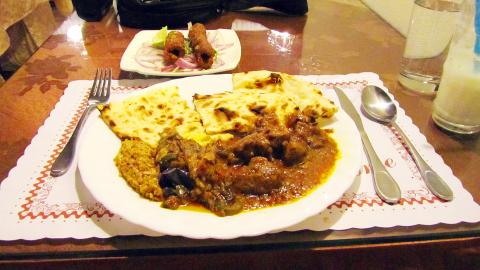Ali Baba’s has long been a fixture on Nanjing East Road, serving up some of the best Indian food to be found in Taipei. In truth there isn’t much competition, with visits to other curry restaurants in
the capital tending to provide dining experiences running from the disappointing to the downright awful.
The decor at Ali Baba’s is showing its age a bit — and dark brown is perhaps not the most inspiring choice of paint color for the ceiling — but the food consistently hits the mark, a fact highlighted by the number of South Asian habitues.

PHOTO: TONY PHILLIPS, TAIPEI TIMES
If you are unfamiliar with Indian food, the extensive buffet is a good way of testing the culinary waters. There are mutton, chicken, seafood and vegetable curries, chutneys, different types of starters, rice, naan bread and even desserts and fruit. In short, if you’re unable to find something to suit your tastes, Indian food probably isn’t for you.
The buffet, which is usually only served at lunchtime on weekends, costs NT$399 plus service. If the latter charge seems odd for a serve yourself affair, soft drinks such as cola, tea or lassi (a sweet, salty or mango-flavored yogurt drink) are included in the price and will be brought to you by a waiter. Service is invariably willing and friendly.
The a la carte menu contains the usual Indian restaurant staples such as tandoori mixed grill, saag gosht (a spiced mutton and spinach dish), assorted birianis and even a few fish dishes.
There is a fair selection of vegetarian options, including palak paneer, which marries spinach and cubes of paneer, a very mild South Asian cheese with a consistency somewhere between tofu and feta cheese.
The naan breads are freshly baked and include keema naan (stuffed with mincemeat) and garlic naan.
Alcohol is not served, but you can bring your own.
My most recent visit, on a Saturday evening, brought the pleasant surprise of the buffet being available, although the waiter said this was a one-off.
I decided to load up on starters opting for the tandoori chicken, vegetable samosas, pakoras and naan. The dryish, somewhat spicy chicken was nicely complemented by the fresh tasting rings of slightly caramelized onions that it
came with.
The samosas — triangular-shaped pastries stuffed with potato and peas — and pakoras — a kind of onion fritter — were crisp and mildly spiced, accompanied by a somewhat sweet, light green mint and yogurt sauce.
I then tried the mutton korma, accompanied by eggplant curry, daal (a lentil dish), seekh kebab and more naan. Rice may have proven a better option second time round as the naan is filling, especially when combined with the rich korma.
None of the dishes was overly spicy, but if that’s your thing you can always go for the vindaloo on the a la carte menu.
Adding to the authenticity of the experience, there’s a TV screen in the dining area which often has Bollywood style music videos playing or sometimes cricket.
Occasionally the ambience may be disturbed by a shrill squawking, but fear not, it’s only the resident macaw, who from time to time makes an appearance on his perch.

Dissident artist Ai Weiwei’s (艾未未) famous return to the People’s Republic of China (PRC) has been overshadowed by the astonishing news of the latest arrests of senior military figures for “corruption,” but it is an interesting piece of news in its own right, though more for what Ai does not understand than for what he does. Ai simply lacks the reflective understanding that the loneliness and isolation he imagines are “European” are simply the joys of life as an expat. That goes both ways: “I love Taiwan!” say many still wet-behind-the-ears expats here, not realizing what they love is being an

Google unveiled an artificial intelligence tool Wednesday that its scientists said would help unravel the mysteries of the human genome — and could one day lead to new treatments for diseases. The deep learning model AlphaGenome was hailed by outside researchers as a “breakthrough” that would let scientists study and even simulate the roots of difficult-to-treat genetic diseases. While the first complete map of the human genome in 2003 “gave us the book of life, reading it remained a challenge,” Pushmeet Kohli, vice president of research at Google DeepMind, told journalists. “We have the text,” he said, which is a sequence of

Every now and then, even hardcore hikers like to sleep in, leave the heavy gear at home and just enjoy a relaxed half-day stroll in the mountains: no cold, no steep uphills, no pressure to walk a certain distance in a day. In the winter, the mild climate and lower elevations of the forests in Taiwan’s far south offer a number of easy escapes like this. A prime example is the river above Mudan Reservoir (牡丹水庫): with shallow water, gentle current, abundant wildlife and a complete lack of tourists, this walk is accessible to nearly everyone but still feels quite remote.

It’s a bold filmmaking choice to have a countdown clock on the screen for most of your movie. In the best-case scenario for a movie like Mercy, in which a Los Angeles detective has to prove his innocence to an artificial intelligence judge within said time limit, it heightens the tension. Who hasn’t gotten sweaty palms in, say, a Mission: Impossible movie when the bomb is ticking down and Tom Cruise still hasn’t cleared the building? Why not just extend it for the duration? Perhaps in a better movie it might have worked. Sadly in Mercy, it’s an ever-present reminder of just